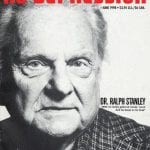Johnny Bush – Horse Opera
The hardest part of this assignment was deciding where to meet for lunch, somewhere that would be equally convenient for Don Walser from his home in Austin and Johnny Bush from his in San Antonio. Once the decision was negotiated to dine at the Guadalupe Smoked Meat Company — just down the street from Gruene Hall, the legendary roadhouse in the tiny Texas Hill Country hamlet of Gruene — the rest went down easier than a cold bottle of Shiner Bock on a hot summer’s day.
Walser and Bush are old friends (each 63 years old, to be exact) and now are labelmates on Watermelon Records. Walser’s new Down At The Skyview Drive-In finds the yodeler known as “the Pavarotti of the plains” expanding his artistic horizons: One cut is a collaboration with the classically avant-garde Kronos Quartet, another is a Texas swing transformation of Irving Berlin’s “Marie”, and a couple more feature duet vocals by Mandy Barnett. Among the country classics he covers is “An Eye For An Eye” by Johnny Bush, which was also previously recorded by Bush’s former boss, Ray Price.
As for Bush, best-known as the writer of “Whiskey River” (forever Willie Nelson’s concert opener), his new disc Talk To My Heart finds the singer once hailed as “the Country Caruso” back in fine form, after a mysterious throat ailment had kept him out of the national spotlight since the ’70s. Wearing a gimme cap sporting the slogan “Attitude Is Everything!”, he showed that the years have done little to change his style or mellow his mood. Once the barbecue was ordered and the conversation started flowing, any pretense toward a formal interview was abandoned.
JB: I last played over there at Gruene Hall in 1976. They booked me back the other day. I can’t imagine, after 22 years. So much for repetition. I was talking to a record promoter yesterday, and she told me something I didn’t know: Mainstream country radio is not playing anything older than 1990. Heck, I’ve got underwear older than that. How do radio stations pick the ten songs they’re going to play?
DW: They sure don’t get it from the public.
JB: We have to let people know our music is available, because they sure don’t hear it on the air. I worked with Hank Thompson the other night in Dallas and he gave me his new tape. Now I’m a Hank Thompson fan and I have been since 1946, but the only mistake he made is he got Brooks & Dunn and Vince Gill and several of the female singers — the only one I knew was Tanya Tucker. I cut grass when I was 12, 14 years old to get enough money to go see Hank Thomspon when he’d come to Cooks’s Hoedown in Houston. He was my hero. My uncle sent off for a picture, and he signed it, “To my pal John, Hank Thompson,” and he put the date on it. After we became friends, I had him re-sign the picture and put the new date on it.
DW: I read in Country Song Roundup one time, where Willie Nelson was being interviewed and he said, “Years ago, I went to work for Johnny Bush. The first night I asked him if I could sing, and he said, ‘Sure.’ Then at the end of the dance, Johnny said, ‘I’ll tell you what, Willie. You play that guitar and I’ll do the singing.”
JB: He brings that up to this day, but I’ve got a tape recording of him playing the guitar and singing back in that time period, 1953. And after you hear that, see if you don’t agree with me. I loved his guitar playing, and I love his singing now, but he sings a lot different now than he did then. Nobody speaks of Willie’s guitar playing, but his guitar playing is as unique as his singing style. I tried to emulate his guitar playing, and I couldn’t.
DW: Willie’s not a great singer, but he sure can sell a song.
JB: People said that he was a talker, not a singer. What he was doing was pitching songs, and he wanted to make sure you heard every word he was writing. He don’t sing like that now.
ND: Both of you guys are plainly known as singers rather than talkers — the “Country Caruso” and the “Pavarotti of the Plains.”
DW: There was a guy named Charles Young from Playboy magazine who came out where we were playing. They were going to make me the centerfold, but I was just too fat for a ten-page foldout. Anyway, he said that old song I wrote called “The Party Don’t Start Till The Playboys Get Here” ought to be the theme song of Playboy magazine, and he said, “I rate this guy the Pavarotti of the plains.” And then all the other music magazines started picking it up.
JB: This Country Caruso thing got started by this music critic out of Houston named Bob Claypool. I think because of my range and my vibrato, but something like that’s hard to live up to. Fortunately, country people don’t know who the hell Caruso was anyway.
ND: With both of you, if you hear one of your cuts, you know instantly who’s singing. Did those styles come naturally or did you pattern yourselves after other singers?
JB: I think I’ve stole from everybody ion the business.
DW: Me, too.




